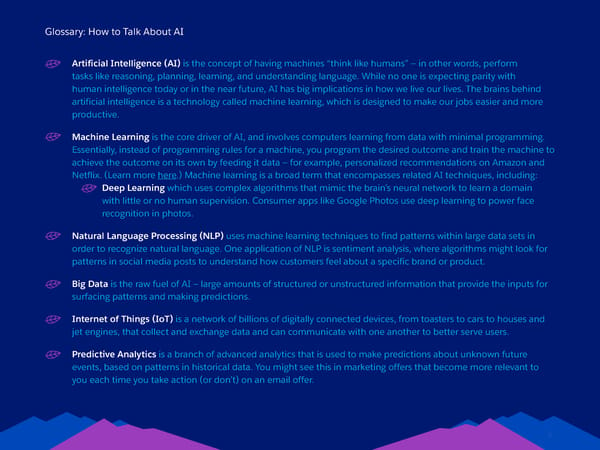Glossary: How to Talk About AI Artificial Intelligence (AI) is the concept of having machines “think like humans” — in other words, perform tasks like reasoning, planning, learning, and understanding language. While no one is expecting parity with human intelligence today or in the near future, AI has big implications in how we live our lives. The brains behind artificial intelligence is a technology called machine learning, which is designed to make our jobs easier and more productive. Machine Learning is the core driver of AI, and involves computers learning from data with minimal programming. Essentially, instead of programming rules for a machine, you program the desired outcome and train the machine to achieve the outcome on its own by feeding it data — for example, personalized recommendations on Amazon and Netflix. (Learn more here.) Machine learning is a broad term that encompasses related AI techniques, including: Deep Learning which uses complex algorithms that mimic the brain’s neural network to learn a domain with little or no human supervision. Consumer apps like Google Photos use deep learning to power face recognition in photos. Natural Language Processing (NLP) uses machine learning techniques to find patterns within large data sets in order to recognize natural language. One application of NLP is sentiment analysis, where algorithms might look for patterns in social media posts to understand how customers feel about a specific brand or product. Big Data is the raw fuel of AI — large amounts of structured or unstructured information that provide the inputs for surfacing patterns and making predictions. Internet of Things (IoT) is a network of billions of digitally connected devices, from toasters to cars to houses and jet engines, that collect and exchange data and can communicate with one another to better serve users. Predictive Analytics is a branch of advanced analytics that is used to make predictions about unknown future events, based on patterns in historical data. You might see this in marketing offers that become more relevant to you each time you take action (or don’t) on an email offer. 5
 AI for CRM Page 4 Page 6
AI for CRM Page 4 Page 6